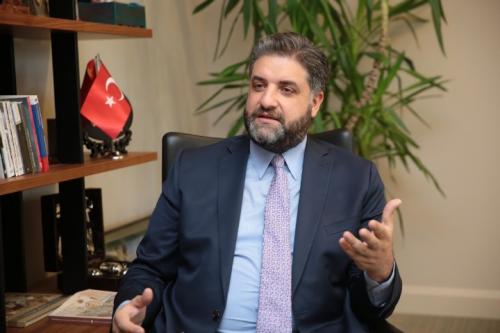



China's Belt and Road Initiative (BRI) is "an essential mechanism for inclusive growth and development across the globe," said Turkish Ambassador to China Emin Önen in an interview with China Daily.
"At a time of disunity and ambiguity in the world, it will be a display of determination in taking forward a concrete proposal for advancing global interests," he added.
The BRI, as understood by the ambassador, is a champion of the global economy and enhanced connectivity and one of its important components is infrastructure building. China-Turkey cooperation in that respect has achieved a wide range of results. Fast and safe travel courtesy of China-made high-speed railway started for the Turkish people in July 2014 when the second phase of the Ankara-Istanbul high-speed rail line went into operation. It was China's first high-speed railway project in Europe.
The Ankara-Istanbul section was built by China Railway Construction Corporation (CRCC) and China National Machinery Import and Export Corporation, in partnership with two Turkish companies.
During the construction, besides language and culture barriers, the high proportion of bridges and tunnels, 42 percent of the entire construction, and the rich granite in the earth added extra difficulty to the project. In late 2013, Turkish President Recep Tayyip Erdogan inspected the rail's final testing and praised its high quality.
Thanks to the new high-speed railway, passengers can now travel the 533 kilometers between the two cities in four hours, about three to five hours faster than conventional trains.
"I have personally travelled lots of time on this line. It is a fast, very comfortable, secure and safe journey," said Önen, visibly excited, adding that the rail connection between the cities is important as they're "economically the biggest two cities of Turkey."
Istanbul is the cultural and financial hub of Turkey and Ankara is the country's second largest city. More than 20 million people travel between the two cities annually.
Turkey has a grand scheme for its own rail network. The country plans to invest $46.4 billion on railways in the next five years, according to Turkish Transport Minister Ahmet Arslan, speaking at the 10th World Congress on High-Speed Rail in May.
During a meeting in September 2018 between Erdogan and China Railway Group's executive director Zhang Zongyan, the Turkish president said that projects on large-scale structured urban reconstruction and transport infrastructure have been initiated in Turkey and that he welcomes more Chinese enterprises like China Railway to participate.
Ambassador Önen also expressed Turkey's expectation for further cooperation with Chinese partners. "We are ready to collaborate with the Chinese firms to create a more integrated Eurasia under the BRI," he said.
During the interview, Önen revealed that Turkey has proposed a new project, the Edirne-Kars high-speed rail line, with Chinese counterparts. "The negotiations have reached a crucial point. We desire that these negotiations end in a positive outcome in the foreseeable future," he said.

Bilateral cooperation between the two countries has also spurred Turkey's employment and talent training, as many locals were involved in the construction of the railway. Yuan Li, president of China Civil Engineering Construction Corporation, a state-owned enterprise (SOE) affiliated to CRCC, said that the locals' involvement helped facilitate technology transfer in the project.
As China's BRI enters its fifth year and keeps gaining momentum, more Chinese SOEs are venturing oversea, and investments in Turkey have expanded to various fields such as energy and tourism.
In October 2018, CRRC Zhuzhou Locomotive Co Ltd also signed a $500 million contract on articulated light rail vehicles with the government of Istanbul. And in February 2017, Turkey's Tuz Lake gas storage facility, built by China's Tianchen Corporation, was launched with an official gas injection ceremony participated in by President Erdogan. The facility, which is expected to store as much as 5 billion cubic meters of gas annually, is said to be the world's largest single cavity underground gas storage.
These are just glimpses, in Turkey alone, of the global ambition of China's ever powerful SOEs. According to the State-owned Assets Supervision and Administration Commission, the combined profits of China's central SOEs shot up 23 percent to 888 billion yuan ($133 billion) in the first half of this year, while their revenues jumped 10.1 percent to 13.7 trillion yuan ($1.97 trillion).
International projects such as the railways and the gas storage facilities in Turkey provide an important platform for Chinese SOEs to expand into the global markets. And on this point, Turkey's pivotal location connecting Asia and Europe proves to be an unrivaled advantage.
"Turkey's strategic location at the crossroads of Europe, Asia and Africa makes it a critical part of the Silk Road," said ambassador Önen. "Being a country on the western end of the Ancient Silk Road, Turkey has in fact long been working on projects to revive this historical route."
The ancient route's revival, an agenda that China and Turkey readily agree on, is actually an important component of China's BRI, for which the ambassador's enthusiasm was apparent.
"From the very beginning, we have supported the Belt and Road Initiative," he said. "We certainly believe that this initiative will open new windows of cooperation for all the countries in the region and beyond."
If you have any problems with this article, please contact us at app@chinadaily.com.cn and we'll immediately get back to you.